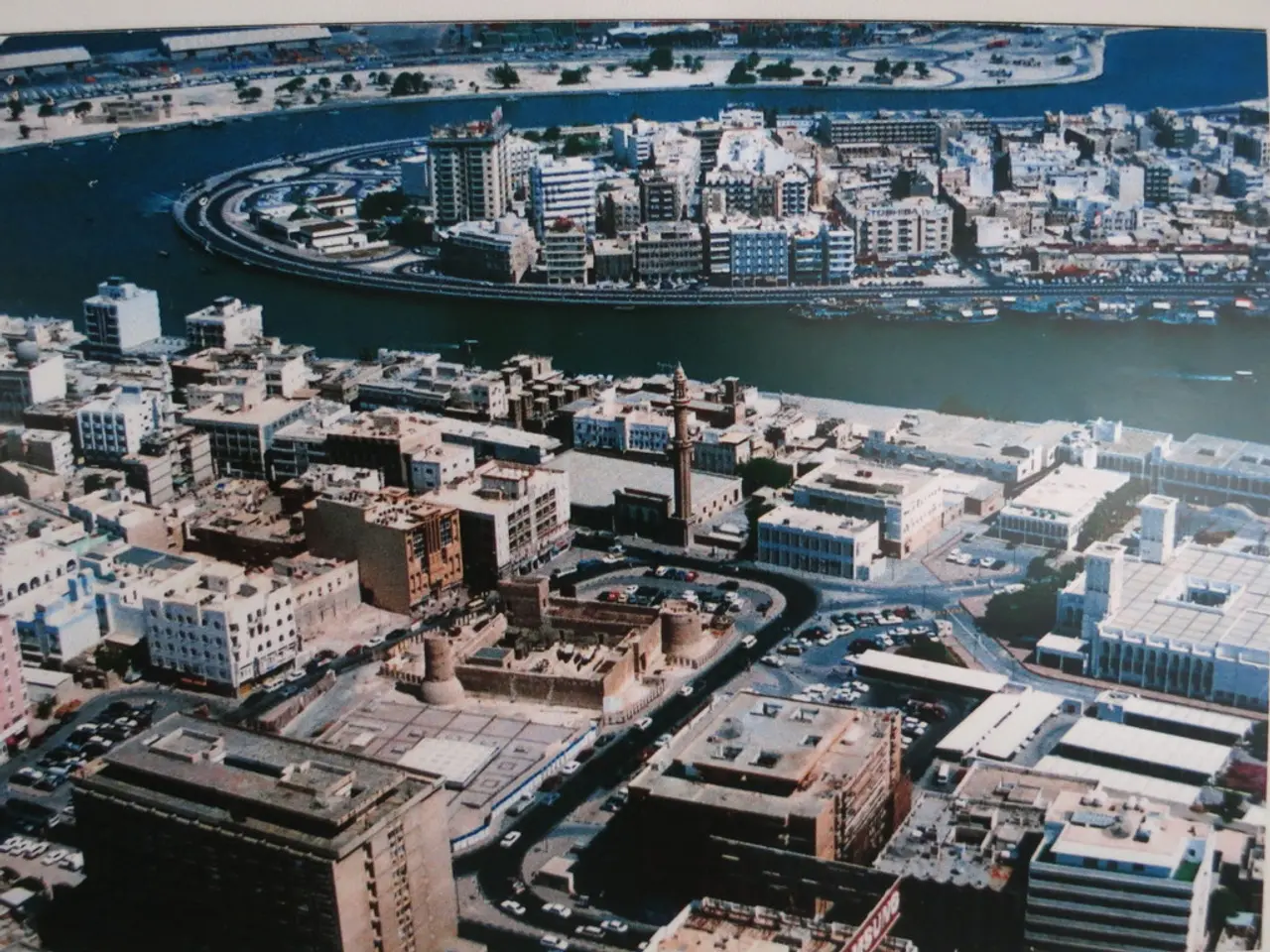Dubai's property market witnessing a surge, boosted by Metro Blue Line expansion
In the heart of the United Arab Emirates, Dubai's real estate market is experiencing a significant boom, with key investment hotspots emerging in areas like Dubai Silicon Oasis, Academic City, and Mirdif, thanks to transformative infrastructure projects such as the Dubai Metro Blue Line.
This surge in the property market is driven by a major infrastructure upgrade that improves connectivity and unlocks potential in previously underappreciated areas. Dubai's real estate remains attractively priced compared to global cities like London and New York, offering strong value for international investors.
The market's vitality is evident in the rising residential prices. On a year-on-year basis, average residential prices climbed 5.6 per cent, with villa prices jumping 7.9 per cent and apartment prices seeing a 4.2 per cent increase.
The growth in the real estate market is further fueled by rising global investor interest and a new generation of tech-savvy buyers. The Metro Blue Line is expected to be a key game-changer for the Dubai real estate sector, going forward.
However, mortgage rates in Dubai, currently between 5.25 and 5.75 percent, are deterring some first-time buyers and existing homeowners from upgrading. Vacancy rates are not expected to increase meaningfully due to the limited pipeline of affordable rentals, keeping pressure on existing stock.
Rents in Dubai are projected to rise between 3 and 4.5 per cent, with strong demand expected for one- and two-bedroom apartments. The rental market in Dubai is tightening, with high borrowing costs and rising home values pushing many residents to rent, keeping rental yields elevated.
Areas such as JVC, Arjan, and Al Furjan are forecast to see increased activity due to their relative affordability and growth potential. Investors are responding by leveraging short-term leasing and extended tenancy agreements to maximize returns in the rental market.
Looking ahead, the future outlook for Dubai's real estate market remains positive. With expectations for sustained demand, moderate price growth supported by increased supply, and ongoing investor confidence due to Dubai's infrastructure expansion and strategic government initiatives, the market is expected to continue its growth trajectory.
Key details supporting this include the rising number of rental transactions, strong sales, particularly in off-plan properties, and continued price appreciation across residential and commercial sectors. Major infrastructure projects, such as expansions in transportation, new urban developments, and mixed-use complexes, have improved connectivity and living standards, attracting residents, tenants, investors, and global companies.
Inventory is likely to remain constrained, especially in affordable and mid-market segments, while high-end handovers dominate the delivery pipeline. Dubai's investor-friendly policies, including zero property and capital gains taxes, long-term residency visas, and digital property registration, continue to attract international capital.
International capital is flowing into Dubai at an accelerated pace, with buyers from the UK, Europe, and India capitalizing on favorable exchange rates and the value of dirham-based assets. In Q2 2025, 58 percent of all real estate transactions were driven by foreign buyers, many of whom are acquiring units for income-generating strategies.
Enhanced tenancy regulations and digital transaction platforms are further increasing transparency and reducing risk for overseas investors. Residential sales in Dubai exceeded Dh120 billion in the first quarter of 2025, marking an 18 per cent rise compared to the same period in 2024.
The outlook for the Dubai real estate market remains optimistic, with price growth expected to moderate to between 3.5 and 5.2 per cent, and the median home price projected to rise from Dh1.7 million to as high as Dh1.79 million. Market experts have noticed a significant increase in buyer interest within infrastructure-linked zones and mature master-planned communities.
In conclusion, Dubai's real estate market is currently vibrant with strong demand in both rental and sales sectors, fueled by strategic infrastructure upgrades. The future outlook is bullish with expectations for continued growth, more diverse offerings, and resilience against global uncertainties, making it a compelling market for residents and investors alike.
- Despite mortgage rates between 5.25 and 5.75 percent deterring some buyers, the Dubai real estate market's future outlook remains positive.
- Rising global investor interest and a new generation of tech-savvy buyers are further fueling the growth in Dubai's real estate market.
- Key infrastructure projects like the Dubai Metro Blue Line are expected to continue improving connectivity and attracting residents, tenants, investors, and global companies.
- International capital is flowing into Dubai at an accelerated pace, particularly from buyers in the UK, Europe, and India, thanks to favorable exchange rates and the value of dirham-based assets.








